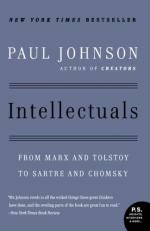|
This section contains 396 words (approx. 1 page at 400 words per page) |

|
Intellectuals Summary & Study Guide Description
Intellectuals Summary & Study Guide includes comprehensive information and analysis to help you understand the book. This study guide contains the following sections:
This detailed literature summary also contains Topics for Discussion and a Free Quiz on Intellectuals by Paul Johnson (writer).
Intellectuals by Paul Johnson is an interesting book about the individuals who have been dubbed as intellectuals. Johnson looks at a group of people from the eighteenth century on and examines their lifestyles and characteristics. Included in this group of intellectuals are Jean-Jacques Rousseau, Percy Bysshe Shelley, Karl Marx, Henrik Ibsen, Leo Tolstoy, Ernest Hemingway, Bertold Brecht, Bertrand Russell, Jean-Paul Sartre, Edmund Wilson, Victor Gollancz and Lillian Hellman.
The secular intellectuals came into being in the seventeen hundreds. They all believed that they could change or re-shape the world by the product of their own intellect. They filled the vacuum created by the decline of the clerical scholars. The secular intellectuals had no common religious beliefs. They all felt that they could tell mankind how best to order their society and run their lives. Since they weren't drawing on any system of religious beliefs, they were basically expressing their own opinions.
Johnson examines what he calls the moral and judgmental credentials of this group of people that felt that they were qualified to tell others how to live their lives. What were their own lives and relationships like? What traits or characteristics did they have in common?
Johnson found several interesting things. All of the intellectuals claimed to be searching for the truth, but all, except for Edmund Wilson, had little regard for facts or the truth. Some, like Betrand Russell, expressed their opinions on just about every subject, without doing research. Others, like Karl Marx, claimed strong support with the workers yet had no contact with them or knew much about their lives. They emphasized concepts and ideas instead of people.
The group of intellectuals had other traits in common. Although they came from varied backgrounds, most of them had financial difficulties and were often in debt. Engels supported Marx and his family for the latter part of his life. Many turned against their parents and some, like Shelley, had no contact with their children. Rousseau gave all of his babies to an orphanage as soon as they were born. Most of the group has loose morals and numerous marriages and affairs. All of them were egotists and sought publicity.
Most people will find Intellectuals and Johnson's conclusions to be interesting reading. The book is not difficult reading and the reader will have a different perspective on intellectuals after reading it.
Read more from the Study Guide
|
This section contains 396 words (approx. 1 page at 400 words per page) |

|



